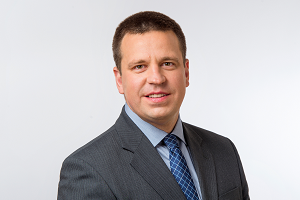Prime Minister Jüri Ratas participated in a video meeting of the European Council this evening to coordinate joint efforts with colleagues in the fight against the coronavirus in Europe.
The President of the European Commission, Ursula von der Leyen, briefed the Council on COVID-19 vaccines and emphasised the importance of clarification. The European Union has strict safety requirements that COVID-19 vaccines must meet and the processes that must be followed before the vaccine can be placed on the market.
Prime Minister Jüri Ratas acknowledged the work of the European Commission in ensuring the widest possible portfolio of EU vaccine candidates for the Member States. “The development and placing on the market of high-quality and safe vaccines is being done as quickly as possible. Estonia is doing everything in its power to be ready to use the vaccine as soon as it is ready and approved by the European Medicines Agency,” said Ratas. For the time being, Estonia wants to ensure the possibility of vaccination for at least half of the Estonian population, giving priority to risk groups. “In the future, the vaccine should be available to everyone in Estonia free of charge,” the Prime Minister said.
The European Commission has so far signed a preliminary agreement with five pharmaceutical companies for the purchase of vaccines and is negotiating with two more. Estonia has joined the preliminary agreement with the pharmaceutical companies AstraZeneca, Johnson & Johnson, and Pfizer/BioNTech. The Commission’s aim is for the pre-purchase agreements to cover vaccines developed using different technologies and a number of vaccine manufacturers.
The heads of state and government also discussed the use of antigen tests. According to Ratas, it is very important for test methods to be reliable. “The performance of rapid antigen tests varies widely, so Member States should agree on common standards and criteria for the selection and use of these tests. Estonia has started testing the performance of rapid antigen tests and we are ready to share our results with other countries,” he said.
The leaders of the Member States also considered it important to continue the exchange of information to reduce the possibility of a new wave. “In order for Europeans to be able to travel safely in the future once the situation has eased, mutual recognition of test results should also be explored,” said Ratas, adding that if travel required a negative test result, an international and secure digital solution for exchanging passenger testing data must be developed. The prime minister also considered it necessary to discuss how the test results could be digitally verified, and expressed Estonia’s readiness to co-operate in the introduction of digital solutions.
German Chancellor Angela Merkel, President of the EU Council, also briefed her colleagues on the current state of negotiations regarding the EU’s next long-term budget and recovery plan. In addition, the Member States received an overview of negotiations with the United Kingdom on future relations.
Photos: https://flic.kr/s/aHsmSfJhHH

 In English
In English  Eesti keeles
Eesti keeles  На русском
На русском 
